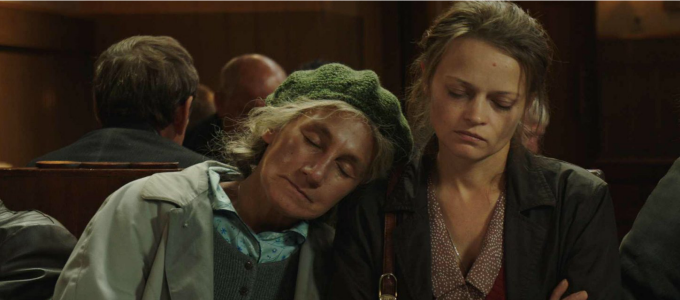
Adapted from the Dostoevsky short story of the same name, A GENTLE CREATURE (Krotkaya) follows an unnamed woman as she embarks on a frustrating, impossibly difficult pilgrimage to deliver a package to her husband in prison. Although there are some excellent character moments, and the absurdist representation of the wide-spread corruption and suffering left in the wake of the Soviet Union is unparalleled, severe pacing issues and a completely unnecessary diversion in the final minutes keep this film from reaching the potential hinted at early on.
Having already tried to send a care package of food, books and clothing to her husband in prison, only for it to be returned without explanation, the nameless protagonist (Vasilina Makovtseva) leaves her small Russian village and treks down to the prison town to try and deliver the parcel in person. When the desk attendant is actively unhelpful – an attitude that emerges in every corner of this tale – the woman is forced to go looking elsewhere for help. While many people claim to be able to offer assistance, each time she is left disappointed, having wasted her time and money on the seemingly endless stream of opportunists looking to take advantage.
Everyone from bus passengers to human rights activists seem to be obstructionist foot soldiers for the stone-walling bureaucracy.
Ironically labelled as the titular “gentle creature”, Makovtseva’s character appears to be anything but – her grim expression and sharp personality are traits of a world-weary woman, all too familiar with the oppressive system she is contending with. Even the many instances where she could be considered naive for taking the help of morally dubious strangers translate more as desperation than gullibility, as she resolutely ploughs onward through multiple set-backs and diversions, determined to find someone who can tell her why her parcel was rejected, and if her husband is even still alive.
Although the film takes it’s name from Dostoevsky’s short story, it leaves the rest between the pages, opting instead to draw inspiration from Franz Kafka’s “The Castle”. Switching out an impenetrable fortress for an unbreachable prison, writer/director Sergei Loznitsa uses the gentle creature’s journey to thoroughly explore his allegorical incarnation of a modern day Russian prison town, where everyone from bus passengers to human rights activists seem to be obstructionist foot soldiers for the stone-walling bureaucracy. Delivered through a veritable parade of oddball characters, the invisible machine that seems singularly geared to keeping a woman from her husband carries the narrative through the less engaging story beats.
Interesting story elements are cast aside in favour of reinforcing a metaphor that is already painfully clear.
Intent as it is to explore the frustrating encountered by the gentle creature as she tries and fails to simply deliver a package to her incarcerated husband – who was convicted for murder, but is allegedly falsely accused – it was almost inevitable that the film would sacrifice pacing to focus on the finer details. As the second act stumbles along, however, interesting story elements such as the potentially false imprisonment of the unnamed husband are cast aside in favour of reinforcing a metaphor that is already painfully clear. Coupled with a wildly unneeded and extremely gratuitous rape scene – included to once again stress a point about the oppression and degradation of citizens that had already been made clear – the narrative leaves a lot to be desired.
After a strong start, and a complex exploration into the endless maze of red tape that is the Russian penal system, A GENTLE CREATURE seems too determined to get its point across, ultimately leaving an uneven ratio between equally interesting plot points. The lack of resolution isn’t by itself an issue – the adamant refusal to comply with audience expectations could even be seen as a meta allusion to the lack of response the woman receives from the government – but capping off a winding, oftentimes bloated narrative, it feels like a forced conclusion, and ends up more frustrating than an unhelpful bureaucrat refusing your prison parcel.

